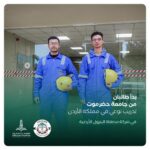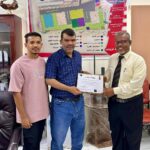Petroleum Engineering Department
Overview:
Petroleum Engineering Department was established in the academic year 1996–1997 as a department of Petroleum and Chemical Engineering with the inception of Engineering and Petroleum Faculty. In the academic year 1999–2000, the department was divided into two separate departments, making Petroleum Engineering Department an independent entity.
The Petroleum Engineering specialization at Engineering and Petroleum Faculty – Hadhramout University is one of the rare specializations at the level of public and private universities in Yemen Republic.
The department is distinguished by its excellent laboratory capabilities, equipped with advanced labs containing numerous laboratory devices that students are trained to use for their scientific research and graduation projects.
The department also has a computer lab with specialized software, recognizing the importance of preparing students to use essential programs in their field of specialization to fully prepare graduates to participate in the modern technological era.
The duration of study in the department is five academic years, after which students are awarded a Bachelor’s degree in Petroleum Engineering upon successful completion of all requirements and examinations. The specialized study includes fundamental and applied courses in exploration, petroleum and natural gas reservoir engineering, production engineering, drilling engineering, petroleum and natural gas transportation and storage engineering, with a particular focus on Yemeni oil fields. The department also emphasizes the use of specialized scientific software and integrates theoretical knowledge with practical application through field visits and practical training in the department’s labs or various petroleum companies operating in Yemen.
Graduates of the department are qualified to work in all stages of oil exploration, drilling, and production operations, as well as planning and managing these operations, enabling them to lead and fully control all operations in the best possible manner.
In the academic year 2023–2024, the department introduced a Master’s program in Petroleum Engineering Sciences.
Mission
To prepare distinguished engineers at the local and regional levels to practice the profession of petroleum engineering, conduct scientific research, keep pace with scientific and professional developments, serve the community, encourage creativity and innovation in the field of specialization, and strengthen partnerships with relevant institutions and governmental bodies.
Vision
To achieve leadership and excellence locally and regionally in the field of petroleum engineering and scientific research in a way that contributes to community service.
Objectives
- To provide students with knowledge, concepts, theories, and practical skills in the field of the oil industry.
- To prepare specialized engineers in the fields of exploration, drilling, production, and management of oil fields.
- To strive for quality in the educational process and support and encourage scientific research in the engineering field to contribute to solving societal problems and development.
- To equip students with technological skills that help them apply modern technologies in the field of oil.
- To prepare engineers capable of innovating solutions to engineering problems and understanding their economic, environmental, and societal impacts.
- To instill professional values and ethics, communication skills, and teamwork abilities in students.
- To strengthen partnerships with governmental institutions and oil companies operating in the country to achieve a partnership between the university and the community.
Deans of Department:
| Name | Academic Title | Period |
| Dr. Osama Abdulhamid Abdelal | Professor | 1996 – 1997 |
| Dr. Mohamed Abdelkader Al-Saffar | Professor | 1998 – 1999 |
| Dr. Essam Kamel Saleh | Professor | 2000 – 2001 |
| Dr. Abdullah Ahmed Baradi | Professor | 2002 – 2004 |
| Prof. Mohamed Mostafa Suleiman | Professor | 2004 – 2010 |
| Dr. Salem Saleh Bamoumen | Professor | 2010 – 2012 |
| Prof. Amer Badr Bin Mardah | Professor | 2012 – 2014 |
| Dr. Mazen Ahmed Meheri | Professor | 2014 – 2016 |
| Dr. Salem Mubarak Bin Qadeem | Associate Professor | 2016 – 2017 |
| Dr. Salem Obeid Ba’arama | Associate Professor | 2017 – 2023 |
| Dr. Saeed Salem Basaleh | Associate Professor | 2024 – Present |
Faculty Members and Their Specializations:
| Name | Academic Title | Notes |
| Dr. Saeed Salem Saeed Basaleh | Associate Professor | Dean of Department |
| Prof. Salem Saleh Mubarak Bamoumen | Professor | |
| Prof. Abdullah Ahmed Omar Baradi | Professor | |
| Prof. Abbas Mohamed Abdu Al-Khadfi | Professor | |
| Prof. Amer Badr Mohamed Bin Mardah | Professor | |
| Dr. Salem Mubarak Saleh Bin Qadeem | Professor | |
| Dr. Mazen Ahmed Mahfouz Meheri | Professor | |
| Dr. Salem Obeid Omar Ba’arama | Associate Professor | |
| Dr. Jamal Salem Awad Bin Gouth | Associate Professor | |
| Dr. Mohamed Abdullah Ali Bamqaa | Associate Professor | |
| Dr. Abdul Raqeeb Ali Mohamed Al-Qadi | Associate Professor | |
| Dr. Khaled Saeed Ahmed Bajalah | Associate Professor | |
| Dr. Badr Salem Abdul Bajri | Assistant Professor | |
| Wahbi Abdul Qader Awad Al-Amri | PhD | |
| Mabkhout Salamah Saleh Bin Dahbaj | PhD | |
| Omar Abdullah Mohamed Omar | PhD | Scholarship Student |
| Shafiq Omar Obeid Balkour | PhD | Scholarship Student |
| Alaa Shafiq Abdullah Al-Daqeel | Master’s Degree | Scholarship Student |
| Arwa Salem Omar Barhoum | Master’s Degree |
Academic Programs
مخرجات التعلم في برنامج الماجستير:
عند اكمال دراسة برنامج ماجستير هندسة بترول سيكون المتخرج قادرا على أن:
- يظهر المعرفة المتقدمة بمفاهيم هندسة البترول.
- يظهر الوعي والفهم للقضايا المعاصرة المتعلقة بالوقود الأحفوري ودورها في مزيج الطاقة.
- يحلل البيانات الميدانية والقياسات لتشخيص المشاكل الحقلية ومشاكل التنمية.
- يحدد مشكلة البحث المعقدة في النفط والغاز.
- يقيم المعدات والعمليات مع اقتراح الحلول المناسبة لتحسين اداءها.
- يطبق مفاهيم العلوم والرياضيات المتقدمة في هندسة البترول وحل المشكلات المعقدة.
- يستخدم التقنيات المتقدمة لتصميم ومحاكاة وإجراء الأعمال النظرية والتجريبية.
- يطبق مصادر التعلم المختلفة في التعلم الذاتي والتعلم المستمر والبحث العلمي.
- ينشرويقدم نتائج البحوث بشكل فعال في المؤتمرات الدولية والمجلات المحكمة.
- يشارك في المنظمات المهنية والتعلم من الخبرات والانخراط في التعلم المستمر.
- يمتلك المهارات القيادية والعمل الجماعي، مع مراعاة المسؤولية المهنية والأخلاقية والثقافية
وصف المقررات :
| السنة الأولى | First year | |||||||
| الفصل الدراسي الأول | First Semester | |||||||
| ت |
اسم المقرر |
الرمز | Actual
الساعات الفعلية |
Credit
الساعات المعتمدة |
Code | Course Title | ||
| T
ت |
P
ع |
T
ن |
||||||
| 1 | هندسة حفر متقدمة | هنب 611 | 3 | PET611 | Advanced drilling Engineering | |||
| 2 | هندسة مكامن متقدمة | هنب 612 | 3 | PET612 | Advanced Reservoir Engineering | |||
| 3 | تسجيلات الآبار المتقدم | هنب 613 | 3 | PET613 | Advanced well logging | |||
| 4 | اختيارية -1 | هنب 614 | 3 | PET614 | Elective-1 | |||
| 5 | ||||||||
| المجموع | 12 | SUB-TOTAL | ||||||
| الإجمالي | 12 | TOTAL | ||||||
ن: نظري ع: عملي ت: تمارين T: theoretical P: practical t: tutorial
| السنة الأولى | First year | |||||||
| الفصل الدراسي الثاني | Second Semester | |||||||
| ت | اسم المقرر | الرمز | Actual
الساعات الفعلية |
Credit
الساعات المعتمدة |
Code | Course Title | ||
| t
ت |
P
ع |
T
ن |
||||||
| 1 | محاكاة المكامن المتقدمة | هنب 621 | 3 | PET621 | Advanced Reservoir Simulation | |||
| 2 | الغمر المائي والاستخلاص المعزز للنفط | هنب 622 | 2 | PET622 | Water flooding and EOR | |||
| 3 | هندسة إنتاج متقدمة | هنب 623 | 3 | PET623 | Advanced Production Engineering | |||
| 4 | اختيارية -2 | هنب 624 | 3 | PET624 | Elective-2 | |||
| 5 | جيولوجيا نفط متكرر | هنب 625 | 3 | PET 625 | ||||
| 6 | سيمنار | هنب 626 | 1 | PET 626 | Seminar | |||
| المجموع | 12 | SUB-TOTAL | ||||||
| الإجمالي | 12 | TOTAL | ||||||
ن: نظري ع: عملي ت: تمارين T: theoretical P: practical t: tutorial
| السنة الثانية | Second year | |||||||
|
ت |
اسم المقرر
|
الرمز | Actual
الساعات الفعلية |
Credit
الساعات المعتمدة |
Code | Course Title | ||
| T
ت |
P
ع |
T
ن |
||||||
| 1 | رسالة البحث | هنب 699 | 6 | PET699 | Thesis | |||
| المجموع | 6 | SUB-TOTAL | ||||||
| الإجمالي | 6 | TOTAL | ||||||
Study Plan – Department of Petroleum Engineering
Bachelor’s Program in Petroleum Engineering
Elective Courses:
Students are required to complete 12 credit hours selected from the following elective courses:
| Actual | Credit | Code | Course Title | ||
| t | P | T | |||
| 2 | 0 | 2 | 3 | PET xxx | Directional Drilling |
| 2
|
0 | 2
|
3
|
PET xxx | Surface Production Facilities |
| 2 | 0 | 2 | 3 | PET xxx | Reservoir Description |
| 2 | 0 | 2 | 3 | PET xxx | Reservoir Management |
| 2 | 0 | 2 | 3 | PET xxx | Water Flooding |
| 2
|
0 | 2
|
3
|
PET xxx | Formation Damage |
| 2 | 0 | 2 | 3 | PET xxx | Well Stimulation |
| 2 | 0 | 2 | 3
|
PET xxx | Naturally Fractured Reservoirs |
| 2 | 0 | 2 | 3 | PET xxx | Horizontal Well |
| 2 | 0 | 2 | 3
|
PET xxx | UnderBalanced Drilling |
| 2 | 0 | 2 | 3
|
PET xxx | Coiled Tubing |
| 2 | 0 | 2 | 3 | PET xxx | Production Logging |
| 2 | 0 | 2 | 3 | PET xxx | Production Systems Design and Analysis |
| 2 | 0 | 2 | 3
|
PET xxx | Advanced Geophysics |
| 2 | 0 | 2 | 3 | PET xxx | Petroleum Reservoirs in Yemen |
| 2 | 0 | 2 | 3 | PET xxx | Heavy Oil Recovery |
| 2 | 0 | 2 | 3 | PET xxx | Offshore Petroleum Technology |
| 2 | 0 | 2 | 3 | PET xxx | Environmental Assessment |
| 2 | 0 | 2 | 3 | PET xxx | Selected Topics |
First Year – First Semester
| Actua | Credi | Code | Course Title | ||
| t | P | T | |||
| 0 | 0 | 2 | 2 | ARAB 111 | Arabic Language I |
| 0 | 0 | 2 | 2 | ENG 112 | English Language I |
| 0 | 0 | 2 | 2 | ISLAM 113 | Islamic Culture I |
| 0 | 2 | 1 | 2 | CSC 114 | Computer Skills |
| 2 | 0 | 2 | 3 | MATH 115 | Differential Calculus |
| 0 | 2 | 2 | 3 | PHYS 116 | General Physics I |
| 0 | 2 | 2 | 3 | CHEM 117 | General Chemistry I |
| 2 | 6 | 13 | 17 | SUB-TOTAL | |
| 21 | 17 | TOTAL | |||
T: theoretical P: practical t: tutorial
First Year – Second Semester
| Actual | Credit | Code | Course Title | ||
| t | P | T | |||
| 0 | 0 | 2 | 2 | ARAB 121 | Arabic Language II |
| 0 | 0 | 2 | 2 | ENG 122 | English Language II |
| 0 | 0 | 2 | 2 | ISLAM 123 | Islamic Culture II |
| 2 | 0 | 2 | 3 | MATH 124 | Integral Calculus |
| 0 | 2 | 2 | 3 | PHYS 125 | General Physics II |
| 0 | 2 | 2 | 3 | COE 126 | Computer Programming |
| 0 | 2 | 2 | 3 | CHEM 127 | General Chemistry ll |
| 2 | 6 | 14 | 18 | SUB-TOTAL | |
| 22 | 18 | TOTAL | |||
T: theoretical P: practical t: tutorial
Second Year – Third Semester
| Actual | Credit | Code | Course Title | ||
| t | P | T | |||
| 0 | 0 | 2 | 2 | PET 211 | English for Oil |
| 2 | 0 | 2 | 3 | PET 212 | Introduction to Petroleum Engineering 1 |
| 0 | 2 | 2 | 3 | PET 213 | General Geology 1 |
| 2 | 0 | 2 | 3 | PET 214 | Statics & Dynamics |
| 2 | 0 | 2 | 3 | PET 215 | Engineering Thermodynamics |
| 2 | 0 | 2 | 3 | MATH 216 | Vectors and Matrices |
| 8 | 2 | 12 | 17 | SUB-TOTAL | |
| 22 | 17 | TOTAL | |||
T: theoretical P: practical t: tutorial
Second Year – Fourth Semester
| Actual | Credit | Code | Course Title | ||
| t | P | T | |||
| 0 | 0 | 2 | 2 | SSS 221 | Communication Skills |
| 0 | 2 | 2 | 3 | PET 222 | General Geology 2 |
| 0 | 2 | 2 | 3 | PET 223 | Reservoir Rock Properties |
| 2 | 0 | 2 | 3 | PET 224 | Introduction to Petroleum Engineering2 |
| 0 | 0 | 2 | 2 | ENG 225 | Technical Writing |
| 2 | 0 | 2 | 3 | MATH 226 | Differential Equation |
| 4 | 4 | 12 | 16 | SUB-TOTAL | |
| 20 | 16 | TOTAL | |||
T: theoretical P: practical t: tutorial
Third Year – Fifth Semester
| Actual | Credit | Code | Course Title | ||
| t | P | T | |||
| 2 | 0 | 2 | 3 | PET 311 | Strength of Material |
| 2 | 0 | 2 | 3 | PET 312 | Petroleum Geology |
| 2 | 0 | 2 | 3 | PET 313 | Well Logging |
| 2 | 0 | 2 | 3 | PET 314 | Reservoir Fluids Properties |
| 0 | 2 | 2 | 3 | PET 315 | Fluid Mechanics |
| 2 | 0 | 2 | 3 | MATH 316 | Engineering Probability and Statistics |
| 10 | 2 | 12 | 18 | SUB-TOTAL | |
| 24 | 18 | TOTAL | |||
T: theoretical P: practical t: tutorial
Third Year – Sixth Semester
| Actual | Credit | Code | Course Title | ||
| t | P | T | |||
| 0 | 2 | 2 | 3 | PET 321 | Drilling Engineering 1 |
| 2 | 0 | 2 | 3 | PET 322 | Formation Evaluation |
| 2 | 0 | 2 | 3 | PET 323 | Geophysics |
| 2 | 0 | 2 | 3 | PET 324 | Production Engineering 1 |
| 2 | 0 | 2 | 3 | PET 325 | Reservoir Engineering 1 |
| 2 | 0 | 2 | 3 | MATH 326 | Numerical Methods |
| 10 | 2 | 12 | 18 | SUB-TOTAL | |
| 24 | 18 | TOTAL | |||
T: theoretical P: practical t: tutorial
Fourth Year – Seventh Semester
| Actual | Credit | Code | Course Title | ||
| t | P | T | |||
| 0 | 0 | 2 | 2 | PET 411 | Principles of Scientific Research |
| 2 | 0 | 2 | 3 | PET 412 | Production Engineering 2 |
| 2 | 0 | 2 | 3 | PET 413 | Drilling Engineering2 |
| 2 | 0 | 2 | 3 | PET 414 | Reservoir Engineering 2 |
| 0 | 2 | 2 | 3 | PET 415 | Computer Applications |
| 2 | 0 | 2 | 3 | PET 4xx | Elective Course 2 |
| 8 | 2 | 12 | 17 | SUB-TOTAL | |
| 22 | 17 | TOTAL | |||
T: theoretical P: practical t: tutorial
Fourth Year – Eighth Semester
| Actual | Credit | Code | Course Title | ||
| t | P | T | |||
| 2 | 0 | 2 | 3 | PET 421 | Storage and Transportation |
| 2 | 0 | 2 | 3 | PET 422 | Well Completion |
| 2 | 0 | 2 | 3 | PET 423 | Well Test |
| 0 | 2 | 2 | 3 | PET 424 | Reservoir Simulation |
| 2 | 0 | 2 | 3 | PET 4xx | Elective Course 2 |
| 0 | 90 | 0 | 0 | PET 425 | Field Training |
| 8 | 2 | 10 | 15 | SUB-TOTAL | |
| 20 | 15 | TOTAL | |||
T: theoretical P: practical t: tutorial
Fifth Year – Ninth Semester
| Actual | Credit | Code | Course Title | ||
| t | P | T | |||
| 2 | 0 | 2 | 3 | PET 511 | Natural Gas Engineering |
| 2 | 0 | 2 | 3 | PET 512 | Petroleum Economics |
| 0 | 6 | 0 | 3 | PET 513 | Graduation Project 1 |
| 2 | 0 | 2 | 3 | PET 5xx | Elective Course 3 |
| 6 | 6 | 6 | 12 | SUB-TOTAL | |
| 18 | 12 | TOTAL | |||
T: theoretical P: practical t: tutorial
Fifth Year – Tenth Semester
| Actual | Credit | Code | Course Title | ||
| t | P | T | |||
| 2 | 0 | 2 | 3 | PET 521 | Enhanced Oil Recovery |
| 0 | 0 | 2 | 2 | PET 522 | Health, Safety & Environment |
| 0 | 6 | 0 | 3 | PET 524 | Graduation Project 2 |
| 2 | 0 | 2 | 3 | PET 5xx | Elective Course 4 |
| 4 | 6 | 6 | 11 | SUB-TOTAL | |
| 16 | 11 | TOTAL | |||
T: theoretical P: practical t: tutorial
Students:
The Department currently enrolls over 360 male and female students.
Since its establishment and up to the academic year 2023–2024, a total of 1,486 students have graduated from the department.
Table: Number of Graduates from the Department of Petroleum Engineering From Establishment to the Academic Year 2023–2024
| Cohort | Academic Year | Male | Female | Cohort | Academic Year | Male | Female |
| 1 | 2000-2001 | 25 | 0 | 13 | 2012-2013 | 71 | 0 |
| 2 | 2001-2002 | 18 | 0 | 14 | 2013-2014 | 84 | 0 |
| 3 | 2002-2003 | 23 | 0 | 15 | 2014-2015 | 90 | 1 |
| 4 | 2003-2004 | 26 | 0 | 16 | 2015-2016 | 111 | 0 |
| 5 | 2004-2005 | 29 | 0 | 17 | 2016-2017 | 79 | 2 |
| 6 | 2005-2006 | 57 | 0 | 18 | 2017-2018 | 90 | 3 |
| 7 | 2006-2007 | 36 | 0 | 19 | 2018-2019 | 66 | 4 |
| 8 | 2007-2008 | 52 | 1 | 20 | 2019-2020 | 69 | 2 |
| 9 | 2008-2009 | 28 | 2 | 21 | 2020-2021 | 96 | 5 |
| 10 | 2009-2010 | 36 | 0 | 22 | 2021-2022 | 80 | 5 |
| 11 | 2010-2011 | 49 | 1 | 23 | 2022-2023 | 104 | 4 |
| 12 | 2011-2012 | 66 | 1 | 24 | 2023-2024 | 66 | 4 |
| TOTAL | 445 | 5 | TOTAL | 1006 | 30 | ||
| TOTAL | 1486 | ||||||








